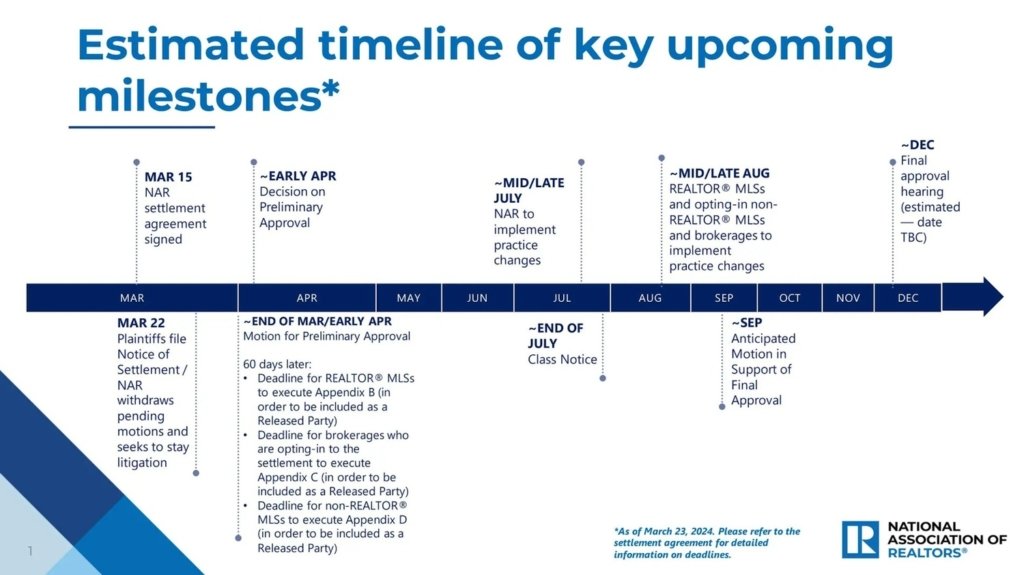Understanding the New NAR Rules
Introduction: On August 17, 2024, the National Association of Realtors (NAR) introduced important changes to the real estate industry, aiming to create a more transparent, fair, and flexible market for both buyers and sellers. These updates come as part of a settlement in lawsuits accusing NAR of violating antitrust laws by mandating seller-paid buyer broker commissions, a practice that allegedly led to inflated commission rates and reduced competition. As part of the settlement, NAR agreed to pay $418 million and implement significant changes, including removing compensation offers from the Multiple Listing Service (MLS).
If you’re planning to buy or sell your residential property in Miami, understanding these changes is crucial for navigating the buying/selling process. In this article, we’ll break down the new rules, explain how things worked before, what’s changed, and how these changes benefit both buyers and sellers. We’ll also cover two key contracts buyers need to know before touring MLS-listed properties: the Exclusive Broker Agreement and the Showing Agreement.

How Was it Before August 17, 2024?
Before these changes, the real estate transaction system was structured in a way that required sellers to offer compensation to the buyer’s broker through MLS listings. This arrangement helped incentivize buyer’s agents to show properties to their clients, while also reducing the buyer’s upfront costs (like agent commission). This structure was particularly helpful for first-time homebuyers, who often faced significant expenses at closing.
However, this system was at the heart of lawsuits filed by home sellers, arguing that NAR’s rules forced sellers to pay a standard commission, stifling competition and driving up costs. The settlements, which resulted in NAR paying $418 million, aim to correct these practices and increase competition in the market. The new rules now focus on making the system more transparent and equitable for all parties involved.
The New NAR Rules – Effective August 17, 2024
The NAR’s new rules, part of the lawsuit settlement, aim to improve transparency, fairness, and flexibility in the real estate market. Here’s an overview of the key changes:
- No More Mandatory Compensation Disclosure on MLS: Compensation for a buyer’s broker will no longer be listed in MLS. Previously, buyer agents could see the compensation details upfront, which sometimes led to biased property choices based on commission rather than client needs. Now, agents can only know this information by asking for it, directly from the listing agent. This help ensure property listings are sent to prospective buyer based on the buyer’s preferences and requirements, rather than compensation incentives to buyer’s broker.
- No Mandatory Compensation by Sellers: Sellers are no longer required to offer compensation to the buyer’s broker to list their property on the MLS. This means buyers can now negotiate the compensation their agent will receive, introducing more control and flexibility into the transaction. While this doesn’t mean buyers will pay their agent’s commission, it allows for compensation to be negotiated along with other key terms, like the purchase price.

How These Changes Benefit Buyers and Sellers?
The new rules offer several advantages for both buyers and sellers in the Miami real estate market:
- For Buyers: The ability to negotiate the compensation their agents will earn gives buyers more control over the financial aspects of the deal. It also ensures that agents focus on showing properties that best suit their client’s needs, rather than those offering the highest commission. Furthermore, buyers and agents will typically have an initial meeting to set expectations before starting the property search, and allowing agents to explain the value they will bring to the transaction, ensuring they are aligned before starting working together.
- For Sellers: Sellers now benefit from the new rules because they are no longer required to offer compensation to the buyer’s broker. This change allows sellers to better manage their costs and gives them more flexibility to negotiate compensation terms, alongside the purchase price and other transaction details. The removal of mandatory compensation also promotes more competitive practices in the market.
Why Sellers often Still Choose to Pay Buyer Broker Compensation?
Although sellers are no longer required to offer compensation to the buyer’s broker under the new NAR rules, many sellers continue to do so—and for good reason. Offering to cover the buyer’s broker commission remains a powerful tool for attracting more potential buyers, especially in a competitive or buyer’s market like Miami, where buyers have more options and greater negotiating leverage.
By removing the burden of agent compensation from the buyer’s side, sellers can make their property more appealing and accessible, particularly to first-time or budget-conscious buyers who may be stretched on closing costs. Since the changes took effect, most sellers are still opting to offer buyer broker compensation voluntarily, recognizing that it increases buyer traffic, supports smoother negotiations, and can ultimately lead to a faster sale at a stronger price point. It’s a strategic decision that, when used wisely, can help sellers stand out in a crowded marketplace.
Buyer Broker Compensation Is Now Part of the Offer Negotiation
With the new rules in place, some sellers may choose not to offer buyer broker compensation upfront. However, this does not mean that buyers are unable to include compensation for their agent as part of their offer. In today’s market, the buyer’s broker compensation has become just another negotiable term—similar to price, closing costs, or repair requests. When submitting an offer, buyers can request that the seller cover their agent’s fee, and sellers will evaluate that request alongside the full scope of the offer. In many cases, sellers will agree if the overall terms are attractive. This flexibility gives buyers and their agents the opportunity to structure deals that reflect both parties’ needs while maintaining transparency and fairness throughout the negotiation process.
Why Buyers Don’t Benefit from Going Directly to the Listing Agent?
Some buyers believe they can save money by going directly to the listing agent, but in Florida, this approach rarely offers a financial or strategic advantage. Most real estate agents in Florida, including listing agents, operate as transaction brokers, meaning they provide limited representation to both the buyer and the seller in the same transaction. While this relationship requires agents to be honest and fair, it does not include full fiduciary duties to either party. Importantly, if a buyer chooses not to have their own agent and works directly with the listing agent, they will still be charged a commission for representation. That commission is no longer automatically paid by the seller and must be addressed in the terms of the buyer’s offer. Without a dedicated buyer’s agent advocating exclusively for their interests, buyers may lack critical guidance in negotiations, contract terms, and due diligence. In today’s more transparent and negotiable environment, working with your own agent offers protection, expertise, and often no additional cost—since commission terms can still be negotiated with the seller as part of the offer.
The Two Broker Contracts You Need to Know
With the NAR’s new rules, buyers must sign one of two agreements before viewing MLS-listed properties: the Exclusive Buyer Brokerage Agreement or the Showing Agreement. Here’s what you need to know:
- Exclusive Buyer Brokerage Agreement:
- This formal agreement creates an exclusive relationship between the buyer and their agent.
- It outlines compensation terms and ensures that both parties are aligned on expectations and obligations.
- It’s ideal for buyers who are ready to commit to working with a specific agent throughout the home search process.
- Showing Agreement:
- A more flexible and informal contract that allows buyers to see properties without committing to an exclusive agent relationship.
- This agreement outlines compensation for specific showings, making it ideal for buyers who aren’t yet ready to sign a long-term commitment.

Conclusion
The NAR’s new rules, effective August 17, 2024, are reshaping the Miami real estate market, giving both buyers and sellers more control and flexibility. By eliminating mandatory seller-paid compensation and enabling buyers to negotiate agent compensation, these changes foster a more competitive and ethical environment. The lawsuit settlement, which included a $418 million payout, has paved the way for these important changes, addressing concerns about inflated commissions and reduced competition.
Whether you’re buying or selling in Miami, these updates are designed to make the real estate process smoother and more transparent. If you need guidance navigating these changes, feel free to reach out. I’m here to help ensure your real estate experience is as seamless and successful as possible.






Join The Discussion